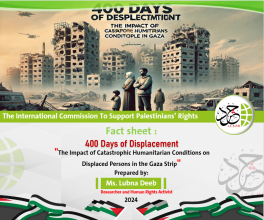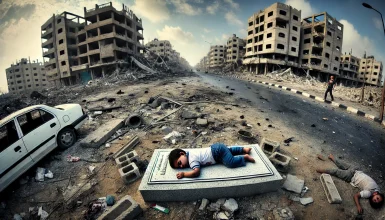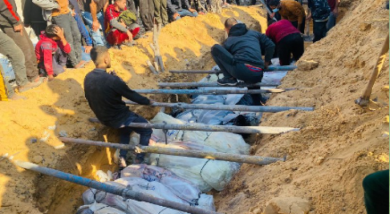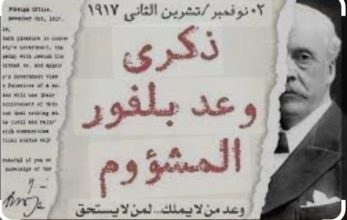
ICSPR ISSUED HUMAN RIGHT REPORT ENTITLED (PALESTINE REFUGEES…VICTIMS OF PERMANENT ASYLUM)
International Commission to Support the Palestinian Rights (ICSPR) issued on Monday morning, 15 may (May) 2017a human right report entitled (Palestine refugees, victims of permanent asylum) the development and publishing of this report within the International Commission to Support Palestinian Rights to participate all Palestinian to commemorate of Palestinian Nakba.
This report aims to gather and analyze legal and political facts that dealt with the Palestinian refugees issue, to reflect the historical reference to this case, the geographical distribution of Palestinian refugees around the world, the economic and social conditions, especially in Gaza Strip, Lebanon and Syria, and the impact of the refugee issue on the political structure of the region, under the successive developments with so-called (The Arab spring). As well as the role of UNRWA and resettlement attempts.
This report assumes great importance, being dealt with a range of legal and practical problems, which accompanied the Israeli State continuing determination not to implement United Nations resolutions concerning the Palestinian refugees, and until this moment Israel refuses to implement resolution 194 of 1948, The reason behind this is due to the weakening role of the international community to pressure Israel to implement its decisions, although United Nations resolutions did not give the Palestinians their full rights, but represent a legal document to claim these rights.
The report reaffirms the international legal and moral principles governing Palestinian refugee rights, these principles internationally established as is beyond reproach and away from questions, what makes it mistake to subject these stable principles for negotiations, that considers a serious historical error, with serious and negative impact, to negotiate any solutions that ignore the Palestinian refugees rights which established in the international principles.
The report concluded, for a set of conclusions and recommendations, chiefly that international law and ethical principles relating to Palestinian refugees beyond reproach and the main obstacle of the international policies to protect and ensure their rights, is the denial of the occupying power to comply these international legal and ethical policies, besides the international community’s unwillingness to pressure for the return of refugees and compensation for their sufferings, and the accountability of the occupying power for it’s crimes against the Palestinian refugees.
Conclusions:
- The clarity of International Law and Ethical Principles regarding Palestinian refugees is beyond doubt and questioning. However, the main obstacle to implementation is the refusal of the occupying state to comply with these international legal and moral policies. The occupying state is being treated as a state above International Law. In addition to the unwillingness of the international community to adequate for the return of refugees, compensate them for the suffering they have been through; and the accountability of the occupying state for their crimes against the Palestinian refugee.
- The promulgation or enactment of any Israeli and/ or American legislation or the acceptance of any efforts in international organizations to stop the automatic transfer of a refugee, who has already been abandoned; to their children and grandchildren is a new episode in denying the rights of Palestinian refugees and a flagrant violation of the International Law.
- The State of Occupation has consistently failed to comply with UN resolutions on Palestinian refugees and continues to refuse to implement resolution 194 of 1948. The failure of the Occupying Power to comply with these UN resolutions because of international community does not pressure on Israel to implement its resolutions.
- The Palestinian Refugees Rights are an integral part of the Arab Human Rights battle in every country. Adhering to slogans such as refusing to settle or maintain the Palestinian national identity or pressure on the international community do not justify the denial of Palestinian Civil, Economic and Human rights; and that their respect does not detract from the Right of Return and does not require states to grant their nationality to refugees.
- The affirmation on the Palestinian right to return to their homes and to restore their original properties; is a sacred historical right built upon the principles of absolute truth and justice before it is based on the principles of international law. The right to return and compensation is not only based on resolution 194, but originally stems from the historical right of Palestinian people in the land of Palestine; which in this sense is an inalienable right or bargaining; negotiation or referendum; and in the same sense radically contradicts all the dubious calls for resettlement, displacement, integration, dissolution or compensation as an alternative to the right of return.
- The Palestinians did not neglect their country -as some claim-. They did all their efforts to preserve their land, but the Zionists planned and improved planning and implementation; and were able to uproot the Palestinians and displace them, all with the British and American assistance and all agents of evil.
- The Palestinian refugee could be defined as “any person whose original place of residence was Palestine and was forced to leave his or her place of residence under fear, persecution, external aggression, internal strife, general violation of Human Rights or events that violated public order, whether in part or all of Palestine that he or she originally belongs to; and can no longer return to his original place of residence. Which caused them to lose their property and lived in exile both within and outside the borders of Palestine”.
- Lebanese state bears a heavy responsibility towards what is happening to Palestinian refugees in the camps of suffering at all levels (educational, health, social, psychological sufferings; the fraying infrastructure and security. It is not sufficient to address the aspect of UNRWA’s (the improvement of services and benefits of donor countries …) on its importance, but the solution lies through the preparation of a development plan that includes mobilization of all refugee camps and communities involved in the preparation of UNRWA, Palestinian Political forces and Civil Society Institutions; Popular Civil Committees and the Host State, the Donor Countries and the Local Community in general; take into account the realization of the Civil, Economic and Social Rights of Refugees.
- The Palestinian refugees in Gaza strip and the West Bank believe that the Israeli occupation is the most important problem facing them, not to mention the independence of the state of Palestine, then it comes the settlements that exist on the lands of the West Bank and Gaza Strip, and then comes the unemployment, poverty, nepotism and the lowness of the services level compared with the population.
- A Lot of refugees think that the lowness of the services given by the UNRWA has political objectives, and they connect it with the most recent events in Palestine, particularly, Oslo treaty and the coming of the Palestinian Authority to Palestine, 66.8% said that there is a relationship between the lowness of the services and the updates that happened after Oslo, explaining that it happened a long time before signing the treaty mentioned above.
- A little number of the Palestinians who think that there are some advantages of the talks about the refugees cause, on the other hand, a large number say that their disadvantages are more than their advantages, more importantly, the diaspora of the refugees and the people who lost their identities.
- Any procedure that aims to get rid of the UNRWA is considered an evidence that the Palestinian case was neglected, the thing that might increase their frustration and the possibility of making a revolution. Therefore, we must do our best to maintain the existence of the UNRWA as the only legal commission based on the international decisions to help and relief the Palestinian refugees.
- The Palestinian refugees maximum protection system says that it is important to create two international agencies that should be responsible for all the Palestinian refugees, that are: the United Nations Relief and Work Agency, which is responsible for aids, and the reconcile commission, which is responsible for all the protection work, and in case any of the two agencies failed doing its job before coming to a final solution for the refugees situation, the protection will be passed on to the refugees commission, and then the refugees agreement will be implemented without any conditions on the refugees. We know that the reconcile commission has dropped its duties, and with all the guarantees given to the refugees commission, then it has the right to investigate and do what is suitable to solve the problems.
Recommendations:
- Emphasizing the Palestinian people’s right to return to their homeland and restoring their properties, considering it a historical right based on International law principles, ICSPR stressing on that this right not only based on 194 resolution but in our historical right in Palestine, as inalienable, non-bargaining, non-negotiable or referendum, and its contrary to all claims of resettlement , displacement, merger, or dissolution or compensation or substitute for return.
- Ensure the unity of the Palestinian refugee issue and their right to return in the framework of the legitimate Palestinian national rights within the unity of land and people in occupied Palestine since 1948 and in West Bank , Gaza, exile and diaspora.
- The important of rejecting plans aiming to liquidate the role of UNRWA through gradual reduction of services, or attempts to transfer to the host-state, taking into consideration that UNRWA reflected the moral ,legal and political responsibility of the international community towards Palestinian refugees and their right to return to their homes from which they were expelled in 1948.
- Refusing the principle of compensation for Palestinian refugees as an alternative of the right to return, and any other projects with political gains.
- Maintaining the UNRWA as a witness on making the Palestinians homeless crime and rejecting the agency’s solution if it is not fair enough, and making a main system for the agency to determine its job and its relationship with the United Nation’s commissions , this might prevent the disability in its budget.
- It is important for the Palestinian representative to get over the stress that happened in the group negotiations that are related to the right of return, dealing with the Palestinian cause totally not partially, and making sure that all the Palestinian refugees get their right of return.
- Activating the role of the Palestinian and Arab legal organizations, which can guarantee reaching the activation of the investigation of the occupation criminal cases and make them carry the responsibility of the Palestinian displacement from their lands.
- It is necessary to activate the role of the Palestinian embassies around the world in order to strengthen its diplomatic moves to get the refugees rights, providing being in the frame of a clear strategy, not in a political way.
- It is necessary to apply act one from the 1951 Refugee agreement on the Palestinian refugees outside the regions the UNRWA covers in order for them to enjoy the protection guaranteed for them by the acts of the agreement.
- Palestinians should be cautious about the significance of re-activating debate committee by increasing the human and financial resources, which guarantees a clear interference for the improvement of the refugee’s lives in Lebanon.
- The necessity of international protection to Palestinian refugees, through work on a resolution that internationalist UNRWA validity of refugee protection alongside with its traditional tasks.
- Adopting strategic plans to improve living conditions for refugees in and outside the camps to ensure that these plans maintain the identity of the camp.





